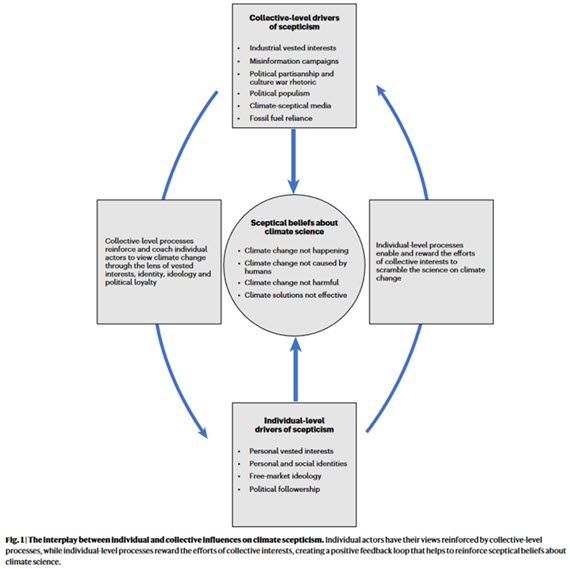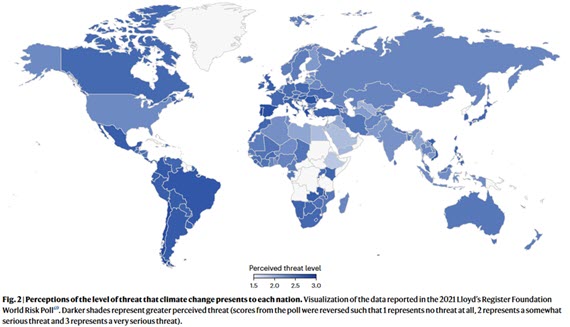New paper: A toolkit for understanding and addressing climate scepticism
Posted on 2 December 2022 by BaerbelW
This is a quick summary about the newly published paper "A toolkit for understanding and addressing climate scepticism" by Matthew J. Hornsey and Stephan Lewandowsky. It leverages a thread tweeted by Stephan Lewandowsky shortly after publication as well as a mention in Doug Bostrom's and Marc Kodack's New Research Week #47
The Abstract
Despite over 50 years of messaging about the reality of human-caused climate change, substantial portions of the population remain sceptical. Furthermore, many sceptics remain unmoved by standard science communication strategies, such as myth busting and evidence building. To understand this, we examine psychological and structural reasons why climate change misinformation is prevalent. First, we review research on motivated reasoning: how interpretations of climate science are shaped by vested interests and ideologies. Second, we examine climate scepticism as a form of political followership. Third, we examine infrastructures of disinformation: the funding, lobbying and political operatives that lend climate scepticism its power. Guiding this Review are two principles: (1) to understand scepticism, one must account for the interplay between individual psychologies and structural forces; and (2) global data are required to understand this global problem. In the spirit of optimism, we finish by describing six strategies for reducing the destructive influence of climate scepticism.
Some Highlights
The authors structured the article around the interplay between individual-level factors, such as personal circumstances or worldviews, and “collective-level” drivers of (organized) climate denial through the usual “think tanks” and so on.
This paralleled the structure of other recent reviews, including Lewandowsky (2021) from last year in the Annual Review of Public Health. What is new in this latest article is that Hornsey and Lewandowsky shift focus away from North America and take a closer look at global data and organized climate denial in Europe. So for example, here are some global data of how much people feel threatened by climate change:
What’s interesting about organized climate “skepticism” in Europe (and especially in Germany) is that given high public acceptance of science, the denial machine is more of a delay machine. Delaying and dismissal of renewable alternatives are the main priority.
So what can we do about all that? The authors review six possible strategies:
| Strategy | Description |
| Appealing to sceptics through value-based frames | In many nations, climate scepticism is particularly strong among conservatives. For this subset of the population, climate change messages will be more effective if they are framed in ways that are congenial to conservative values (for example, as reinforcing energy security, as a way of maintaining a way of life or as an expression of individual responsibility). |
| Appealing to sceptics through co-benefits | Given that they dispute that humans are causing climate change, sceptics may not be influenced by traditional messages that focus on the importance of action to save the environment. However, they may be influenced by arguments that focus on the co-benefits of action in terms of promoting green jobs, stimulating technological innovation or maintaining public health. |
| Leveraging climate-friendly actors within the conservative movement | Conservatives are more likely to be persuaded about the reality and urgency of climate change if these messages are presented by respected figures within the conservative movement. |
| Establishing norms | People are more likely to act in a certain way if they perceive (or are told) that valued others are acting in that way. Because they appeal to our social nature, norms-based interventions can have positive effects independent of political persuasion. |
| Consensus messaging | 97% of climate scientists agree that climate change is happening and is largely caused by humans. Successfully communicating this consensus message has positive downstream influences on climate-friendly attitudes, beliefs and behaviours. |
| Embedding climate-friendly actions in social practice | Positive action is more likely if these actions are embedded in a network of social practices, so that it becomes part of the flow of one’s day and part of one’s social life. |
Will this make a difference? That remains to be seen, but we have been waiting for (too) many decades already, as the authors clarify in their conclusions:
"The first scientific article to draw connections between fossil fuel combustion and climate change dates back more than 120 years and it has been over 30 years since George Bush Senior said: ‘Those who think we are powerless to do anything about the greenhouse effect forget about the “White House effect”; as President, I intend to do something about it.’ However, neither scientific knowledge nor political rhetoric has thus far resulted in global commitments that are sufficient to address the climate crisis."
Summary from New Research
Hornsey & Lewandowsky (2022) produce a comprehensive snapshot of modes of cognitive failure (accidental and inflicted) affecting our halting progress toward solving our climate blunder. The authors don't stop there, but also offer a collection of "interventions for reducing damage," tools given sharp edges by research. There's a hard lesson embedded therein for the climate communications community, one that ought to be intutively obvious: barging into a community with a lot of extraneous political baggage irrelevant to immediate purpose proudly on display is counterproductive, destructive to progress. Any of us with a cranky uncle knows: a single trigger word can end rational behavior. The authors put it more tactfully: "sceptics will be more influenced by messengers that share salient identities with them: rural people will be more influenced by rural messengers, conservatives will be more influenced by conservatives, and so forth. This is a challenging message for many climate activists because it underscores how their identification as green or left can be enough to render their voices impotent when it comes to influencing sceptics." [bold ours] As a review article A toolkit for understanding and addressing climate scepticism is a fast and complete spin-up for people new to this game, and very probably a worthwhle refresher for old hands.































 Arguments
Arguments
































Thanks. Sounds like good, credible analysis and good advice to me.
Here's a story which is hopefully relevant. John Key was the leader of the New Zealand National Party when it was in government a few years back. Both Key and his party lean conservative, and Key used to be a climate sceptic. He said in an interview on television he became convinced humans were responsible for climate change when he was presented with a graph showing the warming trend and solar irradiance together, and clearly there was no correlation over the last 50 years.
For me a picture with some accompanying commentary like this is simple and paints a thousand words, and cuts through a lot of complicated maths and physics. Not once have I ever seen that graph in our media - and they do many articles on climate change. The point Im making is the media and climate community sometimes overcomplicate the issues, and leave out the simple clear things, and so have to take responsibility for some of the scepticism.
You wont actually convince the hard core of sceptics anyway. They are a mixture of stubborn cranks and people strongly driven by libertarian ideologies and people who are excessively worried that climate mitigation might affect their status in life. We know those people are very fixed in their views right through their lives. So any strategy to convince sceptics has to focus on the "reasonable sceptic" and what might change their minds! While its trendy to say facts don't convince people, I don't think thats entirely true with reasonable people. But facts need to be kept simple and focus in simple ways on core issues, like what might be causing climate change and what the evidence says on those things. This is done very well on this website, but not so well in the general media.
Al Gores book An Inconvenient Truth did a nice job on the science in my view, but had nothing on the sceptics and their climate myths and why they were false. Presumbaly he felt he didn't want to give them oxygen but I think it was a misake not to address such issues. Because they will inevitably get into the media and anyway. And by then we are on the back foot.
Excuse me for being a bit ranty, but hopefully you get what I'm saying.
nigelj,
I agree with your assessment and recommendations.
A minor supplement: Check out Al Gore's 2007 book "The Assault on Reason". It is about the 'unjustified and unreasonable' tactics abused by some political players. But it is not focused on misleading messaging regarding climate change.
I suspect this is an excellent article in its entirety, as this summary is an attention grabber. It's a shame the entire article is behind a paywall and inaccessible to those of us who have long ago retired from an institution with a subscription. This is much too important a topic to require $32 to read it.
[Update: Unfortunately this paper will not be open access until 6 months after publication, apparently a glitch in reportage from the journal. We apologize for the error.]
Sorry about that, wstephen.
It's our practice to only center publications suggested for our readers' attention that are open access.
At the time this item surfaced for New Research, Unpaywall identified it as open access and indeed it was (we always check, for highlights). Now it's not.
Working on it and hope to remedy.